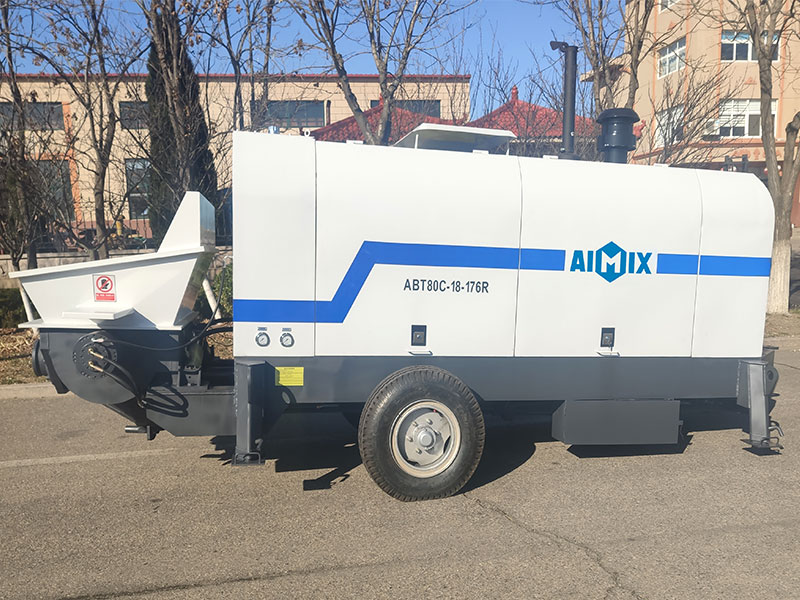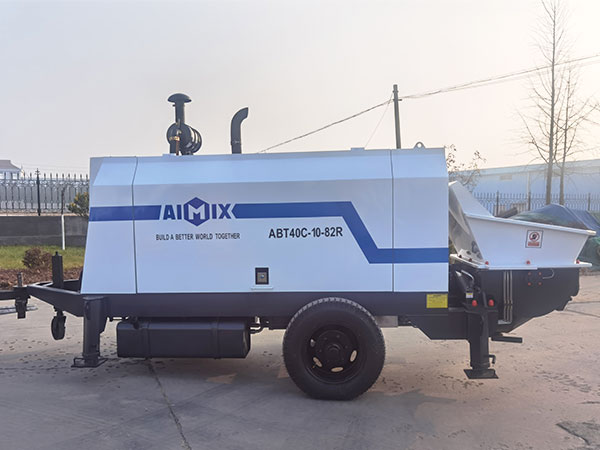The hydraulic system is the heart of a concrete pump, providing the power necessary to operate the pump’s various functions with precision and efficiency. Proper maintenance of the hydraulic system is crucial to ensure the reliable performance and longevity of the concrete pump.
1. Understanding the Hydraulic System
Before diving into maintenance procedures, it’s essential to understand the components and operation of the hydraulic system in a concrete trailer pump for sale. The hydraulic system consists of a hydraulic pump, hydraulic fluid reservoir, hydraulic cylinders, valves, hoses, and fittings. The hydraulic pump pressurizes the hydraulic fluid, which is then distributed to the cylinders and valves to control the movement of the pump’s boom, pistons, and other components.

2. Regular Inspection and Monitoring
Regular inspection and monitoring of the hydraulic system are essential to detect potential issues early and prevent costly breakdowns. Operators should visually inspect hydraulic hoses, fittings, and connections for signs of leaks, damage, or wear. Additionally, monitoring hydraulic fluid levels and temperature, as well as observing the performance of the mini concrete pump‘s functions during operation, can help identify any abnormalities that may indicate underlying hydraulic system problems.
3. Maintain Proper Hydraulic Fluid Levels
Maintaining proper hydraulic fluid levels is critical for the smooth and efficient operation of the hydraulic system. Operators should regularly check the hydraulic fluid level in the reservoir and top it up as needed with the manufacturer-recommended hydraulic fluid. It’s essential to use the correct type of hydraulic fluid specified by the pump manufacturer to ensure compatibility and optimal performance.
4. Change Hydraulic Fluid Regularly
Regularly changing the hydraulic fluid is essential for maintaining the cleanliness and effectiveness of the hydraulic system. Over time, hydraulic fluid can become contaminated with dirt, debris, and moisture, which can impair the performance and reliability of the system. Operators should follow the manufacturer’s recommended schedule for hydraulic fluid changes and use high-quality, clean hydraulic fluid to ensure optimal system performance.

5. Filter Maintenance and Replacement
Hydraulic filters play a crucial role in keeping the hydraulic system clean and free from contaminants. Operators should regularly inspect hydraulic filters for signs of clogging, damage, or wear and replace them as needed. Clogged or dirty filters can restrict the flow of hydraulic fluid, leading to reduced system efficiency and increased wear on hydraulic components. Regular filter maintenance helps prolong the life of the hydraulic system and ensures reliable aimix concrete pump operation.
6. Check Hydraulic Hoses and Fittings
Hydraulic hoses and fittings are vulnerable to wear, abrasion, and damage due to constant movement and exposure to harsh operating conditions. Operators should inspect hydraulic hoses and fittings regularly for signs of leaks, cracks, abrasions, or corrosion. Any damaged or worn hoses and fittings should be replaced promptly to prevent hydraulic fluid leaks, which can lead to system inefficiency and potential safety hazards.
7. Lubricate Moving Parts
Proper lubrication of moving parts is essential for reducing friction, minimizing wear, and prolonging the life of hydraulic components. Operators should regularly lubricate hydraulic cylinders, valves, pistons, and other moving parts with the manufacturer-recommended lubricants. Proper lubrication helps maintain smooth operation and prevents premature failure of hydraulic system components.
8. Perform System Flushing
Periodic system flushing is recommended to remove any accumulated contaminants or debris from the hydraulic system. Flushing the system involves circulating clean hydraulic fluid through the system to flush out any dirt, sludge, or debris that may have accumulated over time. This helps maintain system cleanliness and ensures optimal performance of the hydraulic system.
9. Schedule Regular Maintenance Checks
In addition to regular inspections and maintenance tasks, scheduling periodic maintenance checks by qualified technicians is essential for ensuring the long-term reliability and performance of the hydraulic system. Professional technicians can perform comprehensive inspections, tests, and adjustments to identify and address any potential issues before they escalate into costly repairs or downtime.
Conclusion
Maintaining a concrete pump hydraulic system is essential for ensuring the reliable performance, efficiency, and longevity of the small concrete pumps. By following these essential tips and techniques, operators can effectively maintain their hydraulic systems, detect potential issues early, and prevent costly breakdowns or safety hazards. Regular inspection, monitoring, fluid maintenance, filter replacement, lubrication, and professional maintenance checks are key to keeping the hydraulic system in optimal condition for smooth and efficient pump operation.